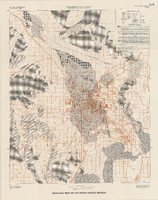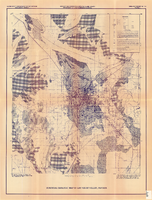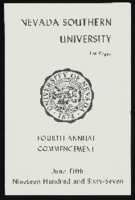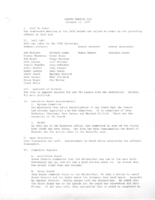Search the Special Collections and Archives Portal
Search Results
Dennis McBride LGBTQ Poster and Sign Collection
Identifier
Abstract
The Dennis McBride LGBTQ Poster and Sign Collection (1977-2018) contains posters and signs created by the Las Vegas, Nevada Lesbian, Gay, Bisexual, Transgender, and Queer/Questioning (LGBTQ) community, collected by historian Dennis McBride. These handmade and commercially printed signs cover events of particular interest to the Las Vegas, Nevada LGBTQ community, including social events, entertainment venues, political rallies, and Gay Pride events.
Archival Collection

Jill Roberts oral history interview: transcript
Date
Archival Collection
Description
Oral history interview with Jill Roberts conducted by Barbara Tabach and Claytee D. White on March 20, 2018 for the Remembering 1 October Oral History Project. In this interview, Jill Roberts discusses her position as the CEO of the Trauma Intervention Program (TIP) of Southern Nevada. She also delves into her part-time work at the coroner's office as a death investigator and discusses her personal background in Las Vegas, Nevada after she moved to the city in 1977. She describes the role TIP had during the aftermath of the October 1, 2017 mass shooting, where well-trained volunteers were dispatched to hotels, hospitals, and anywhere else the survivors reached in order to provide emotional and practical support. Throughout the interview, Roberts emphasizes that the assistance provided to those in a traumatic event depends on each individual's needs. She shares a few examples of what the TIP volunteers had helped with after the shooting, including listening to the survivors' stories as well as providing information on the situation, helping separated loved ones find each other, arranging travel for some survivors to go back to their homes, and procuring clothes and shoes for those who needed them. Roberts also discusses the gratitude TIP had received after the shooting, including the thank you cards sent by Sandy Hook High School.
Text

Geologic map of Las Vegas Valley, Nevada, 1982
Date
Description
2320-A. Originally published as plate 1 of Ground-water conditions in Las Vegas Valley, Clark County, Nevada. Part I. Hydrogeologic framework / by Russell W. Plume, published by the U.S. Geological Survey in 1989 as Water-supply paper 2320-A.
Image

Surficial geologic map of Las Vegas Valley, Nevada, circa 1981
Date
Description
84-130. Originally published as plate 1 of Ground-water conditions in Las Vegas Valley, Clark County, Nevada. Part I. Hydrogeologic framework / by Russell W. Plume, published by the U.S. Geological Survey in 1984 as Open-file report 84-130.
Image

Nevada Southern University 4th commencement program
Date
Archival Collection
Description
Commencement program from University of Nevada, Las Vegas Commencement Programs and Graduation Lists (UA-00115).
Text

Meeting minutes for Consolidated Student Senate, University of Nevada, Las Vegas, August 05, 2002
Date
Archival Collection
Description
Text

Meeting minutes for Consolidated Student Senate, University of Nevada, Las Vegas, October 11, 1977
Date
Archival Collection
Description
Text

Patricia Vazquez interview, November 14, 2018, June 14, 2019: transcript
Date
Archival Collection
Description
Session 1: Interviewed by Marcela Rodriguez-Campo. Barbara Tabach also participates in the questioning. Session 2: Interviewed by Rodrigo Vazquez. Monserrath Hernandez also participates in the questioning. Patricia Vazquez was born and raised in Las Vegas, NV and shares her experiences growing up in the Valley as a Queer Latina. At a young age, she remembers traveling back and forth between Mexico and the U.S. to visit family. When she started school she shares how her home language, Spanish, became her family's "secret language" as she began to learn English. During elementary school Patricia was tracked into the special education program, and remove from the mainstream classroom. She would find her love for learning in books and libraries as she taught herself how to read in English. Despite being tracked into less advanced courses, Patricia would end up taking AP/ Honors courses in high school after forging her favorite teachers signature, which changed her educational trajectory. After coming out to her family, Patricia went nearly a decade distanced from her mother and continued her college education at Arizona State University. There, she would complete a bachelors in painting and a masters in comparative literature. Her work with the Chicano Studies program at ASU helped her develop her Chicana identity and begin her involvement in social activism. In Las Vegas, she worked to fight for marriage equality and LGBTQ rights with the American Civil Liberties Union , and later with the Progressive Leadership Alliance of Nevada. She also conducted several lectures for the Latino Youth Leadership Conference on sexuality, gender, and homophobia for over a decade. She has served as an English Professor at the College of Southern Nevada for the last 20 years and is an avid hiker, traveler, and painter.
Text

Marvelys Lopez Omaña oral history interview: transcript
Date
Archival Collection
Description
Oral history interview with Marvelys Lopez Omaña conducted by Monserrath Hernandez and Barbara Tabach on February 21, 2020 for the Latinx Voices of Southern Nevada Oral History Project. In this interview, Marvelys Lopez discusses her childhood and growing up in Caracas, Venezuela, where her father owned a toy store. She attended an all-girls Catholic School and from a young age knew that she wanted to be a doctor. In 1993, at the age of seventeen, she was able to study abroad in the United States for one year and moved to Las Vegas, Nevada. She returned to Venezuela to attend medical school and while attending medical school she met her husband, who was studying to be a registered nurse at the time. Lopez Omaña recalls volunteering as a firefighter in Venezuela, and discusses the political change that happened in Venezuela during her last years in medical school. She moved to back Las Vegas with her husband in 2003 and began working as a caregiver. She recounts Her first son's birth story, and describes how she became a Certified Professional Midwife.
Text

Dr. Alvaro Vergara-Mery oral history interview: transcript
Date
Archival Collection
Description
Oral history interview with Dr. Alvaro Vergara-Mery conducted by Barbara Tabach on October 28, 2020 for the Latinx Voices of Southern Nevada Oral History Project. Alvaro discusses his personal history and his upbringing in both Chile and the United Kingdom before immigrating to the United States; due to political unrest in Chile, he moved to the U.K. where his mother was born before attending university in the United States. Alvaro talks about his work as a medical interpreter for University Medical Center (UMC) as well as his college teaching experience at University of Nevada Las Vegas and California State Berkley.
Text
